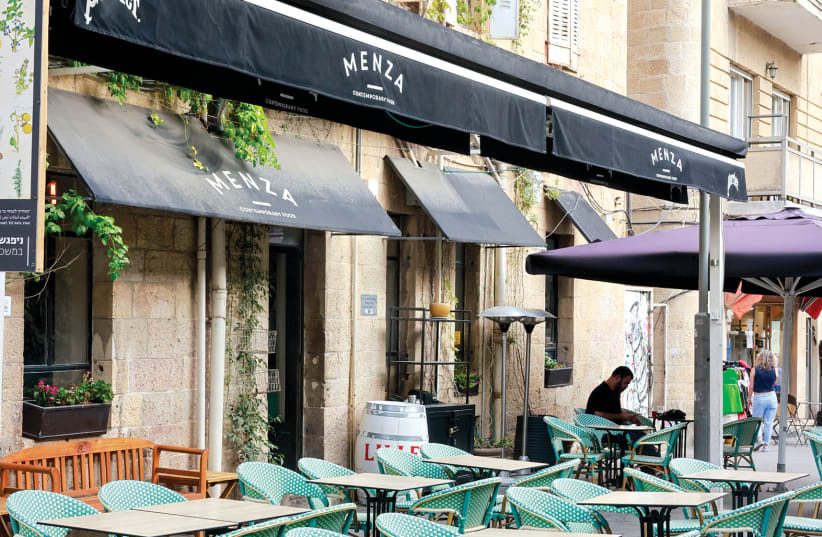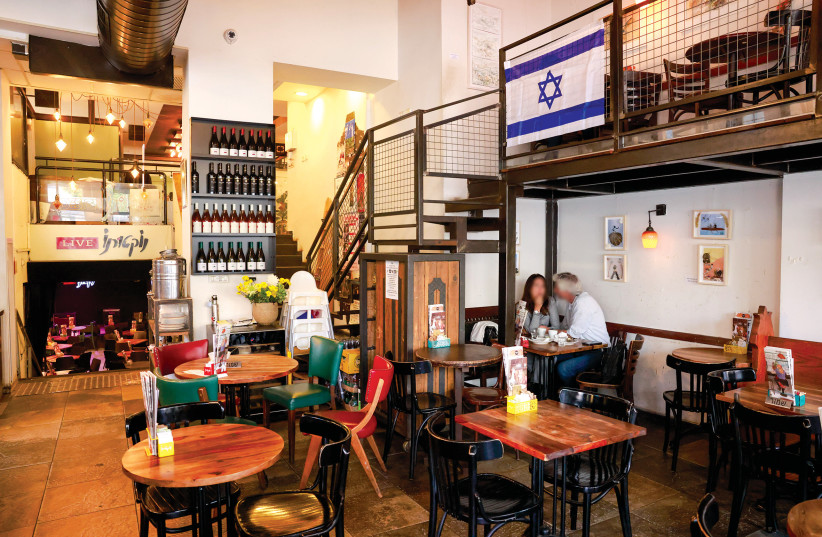We are not exactly short on downers right now. Betwixt the anxiety over loved ones held God-knows-where in Gaza, loved ones lost, family members serving in the army, and the emotional challenges of having to relocate to unfamiliar pastures, there is the simple concrete dome scratcher of how to make a living.
The way ahead, at least in the short term, seems to be littered with obstacles of varying degrees of logistical difficulty. And, even with all the wonderful, heartwarming kindness of simple folk offering their time, skills, and talent, and generally covering their concomitant costs themselves, with a little help from the official state and local institutions too, these are tough existential times.
Evacuees from North and South
Jerusalem hotels, for example, are now filled with evacuees from the South and the North. And while the municipality and other organizations are providing some basic services, and others, such as artists generously proffer talents and facilities to keep the temporary domestic refugees engaged, there is nothing like full-time work to keep one out of mischief and suitably buoyant.
Elishama Rabinovich certainly subscribes to that line of active thought. He is one of the evacuees whom the municipality managed to help along the financial and emotional road by putting him in touch with a local employer with a vacancy. In quieter times, although for the long-suffering residents of Sderot that is certainly a relative epithet, Rabinovich makes a living in the catering sector. But, once he and his wife and young daughter were safely ensconced at the Olive Tree Hotel, he felt he needed to get out and about and get his nose back to the grindstone.
According to the Jerusalem Municipality spokesperson, Mayor Moshe Lion was keen to kick-start plans to breathe new life into the city, as many Jerusalemites initially opted to steer clear of any potential security dangers by staying at home. Businesses across town were either left completely bereft of personnel or simply did not have much in the way of work or raw materials, as suppliers and clients alike went into shutdown mode.
“Local businesses are the heartbeat of Jerusalem, and their contribution to its financial strength and prosperity is very significant,” Lion declared. “As such, we are helping business owners to cope with the challenges all along the road. These are some of the steps we have taken in light of the [security] situation, to enable them to continue to grow and develop. With mutual responsibility and the Jerusalem spirit – together we will triumph!”
Strong and stirring words, indeed. But how does that mayoral performance translate into cold hard comforting facts on the bread-winning ground?
If Rabinovich is anything to go by, the municipality is doing very nicely, thank you. After spending a week with his in-laws in Beit Shemesh, followed by another week with his own parents up north, Rabinovich and his family decided to take up the offer to move to a hotel in Jerusalem, along with other evacuees from Sderot.
“We needed to have our own space, and I thought the chances of finding employment in Jerusalem would be much better,” Rabinovich surmised. That turned out to be a pretty good hunch, even though finances were not the primary objective.
“I didn’t know how things would progress in terms of state financial support or how long that would take,” he observes. Not that he was down to his last shekel.
“My employer [in Sderot] paid me my regular salary at the end of October,” he notes. That was pretty generous of the boss. “That was after almost a whole month when I didn’t work at all.”
But Rabinovich doesn’t appear to be the type to sit around and just count his blessings. “I didn’t look for employment mainly to make some money. It was to refresh my spirit.” That worked out pretty well, and in double quick time. A day after the Rabinoviches moved into the hotel, he encountered the folks from the municipality’s Reshut Hata’asuka (Employment Authority). “I saw them sitting in the lobby and asked them what they were doing. They told me they were there to help people find jobs in Jerusalem. The next day, the woman there gave me the phone number of the manager of a supermarket, and the day after that I started working there.” Good to know, especially these dark days, that some things do work out.
And, in a moving event, Mayor Lion met up with evacuee Sderot parking enforcement officer Meir Gabai, whose daughter was killed in the conflict, after Gabai found temporary employment in Jerusalem.
Lion springs into action
The municipal spokesperson advised me that Lion sprang into action just as soon as he could, looking to gain a good handle on the street-level wartime situation and to see how the municipality could best help local enterprises weather the storm. That includes downtown cafés that were left short on both fronts – clientele and personnel.
“Jerusalem Mayor Moshe Lion met today with some 120 business owners from Jerusalem,” went the official statement released on October 25. “The aim is to maintain a dialogue about the impact of the security situation on businesses in the city and to listen to the different needs of the business owners. These discussions also highlighted the challenges faced by the economy of Jerusalem in light of the situation.”
The statement noted that senior municipal officials also attended the meeting, led by municipal director general Itzik Lari, “in order to provide a system-wide solution for the various needs.” It goes on to say that “at the start of the war, the mayor issued a directive to revoke all the various levies charged to business owners, with a view to providing some immediate relief for local businesses.”
The Jerusalem spirit
If Amit Magal is anything to go by, the jury is still out on that score. Magal is the founder and proprietor of the popular Nocturno café, located betwixt the Schatz-Bezalel pedestrian street and the new arts campus down the road on Bezalel Street. He says the municipality has demonstrated “a lot of goodwill,” although he is waiting to see how things pan out. “The arnona (municipal rates) went out today, but that is the responsibility of the Interior Ministry.”
As I approached the café, I steeled myself for a depressing scene of empty sidewalk tables, with Magal and whatever wait staff he managed to recruit sitting around twiddling their thumbs.
In fact, almost all the outdoor tables were taken by, presumably, regulars of all ages. However, the seeming “business as usual” picture, it transpired, was a little misleading.
“We are running at 50% of our regular turnover,” Magal notes. Shades of the dismal days of the COVID era? “It’s worse,” he says. “During the coronavirus, the general mood was not like this. The COVID-19 period went on for longer. I hope this doesn’t go on for so long,” Magal quickly adds.
Lowered revenues
A month into the war, the revenue figures do not make for happy reading.
“The [financial] damage caused by a whole month of very little work is indescribable. This is about the business and social side, not the cost of human life. Months of hard work went down the drain. October should have been our best month.” That was due to be the cash till resurgence following the traditionally fallow month of September, with all the religious holidays and before the students, attending Bezalel Academy of Art and Design, the Nissan Nativ Acting Studio, and other academic institutions that relocated to the new campus, returned to the classrooms. Many of the students hail from Tel Aviv and other parts of the country and augment the local workforce and also the consumer pool, particularly in the café and other eatery sectors. “Succot was very successful for us and we thought, this is the month when we get back on track,” Magal recalls.
Nocturno is not just a good place to down an espresso and cold and hot vittles. Over the years, Magal has developed an eclectic program of shows, taking in pop, rock, jazz, spoken word, and a broad range of performance arts. The October entertainment and tailored hosting plans went down the tubes and sank without a trace. “We had private and boutique events, two student parties, and over 20 shows all lined up. Everything was canceled.”
The importance of getting together
Like the rest of us, Magal, who lives in Mevaseret Zion, was knocked for six on October 7. He moved his family to his in-laws down the road, who have a safe area in their house. But, tension and security concerns notwithstanding, he was eager to leap back into the saddle as soon as possible. Some sort of emotional survival instinct kicked in, and a desperate need to cling on to something normal amidst all the turmoil.
“We didn’t reopen the following day because, suddenly, almost my entire staff was mobilized. And anyone who wasn’t called up, ran to their parents and the safe areas.”
Somehow Magal got the Nocturno act back on the road. It quickly became clear that the café was more than a supplier of tasty food and beverages. It was a refuge from the terrorist horrors. “The first week, we were open daily until 4 p.m. Very few customers turned up. It was more for our morale. Everybody who came here started crying. They cried on our shoulders, and we cried with them. It showed us the importance of being together.”
Magal, along with many other purveyors of the arts and cultural offerings, sees the value of providing the public with succor for the soul, and the likes of venerated singer-songwriter Leah Shabbat, pop-rock violinist Michael Greilsammer, and jazz-ethnic music pianist Omri Mor have all strutted their stuff on the Nocturno stage in the past few weeks.
The café has also done its bit to support the war effort in more concrete, edible, terms. “We supplied the Jerusalem war room [at the campus] with sandwiches for 40 people – gratis – every day,” Magal says. How much longer Nocturno and other businesses in the city can keep going in these trying economic circumstances, only time will tell.
But, at least, the artists who perform at the café do get some much-needed fiscal remuneration for their efforts.
“We’ve got a new series we call With Love from Nocturno Live. We offer tickets at regular prices, to support the artists. And there are tickets for people serving in the security forces at half price, and for evacuees at NIS 10 each. We really want people to come, and get a break.”
Funding for culture
Apparently, the municipality has come up with NIS 20,000 to support cultural initiatives around the city.
Meanwhile, the likes of Magal keep on doling out the good spiritually bolstering and tasty stuff while the state taxpayer-supported institutions continue to drag their feet. Still, there have been some helping hands forthcoming from other quarters.
“There are some bodies that straightaway helped on the cultural side,” Magal notes. “There is the Jerusalem Foundation, which immediately gave us a little funding, and JCU (Jerusalem Culture Unlimited) gave us something. We began without a budget. We said to Michael [Greilsammer], come and perform here, we’ll pay. We didn’t want to wait for a budget to appear because we felt that culture has to happen right now.”
Meanwhile, Rabinovich is just happy to be working but would much prefer to be making a living on his home patch, back in Sderot. “The Jerusalem Municipality really did a good job and helped us out, but we would like to be home to light Hanukkah candles,” he says.
Let’s hope the violence down South is over by then, our hostages in Gaza return to their families as safe and sound as possible, and the evacuees and the rest of us can get back to our normal lives. ❖
Visit the municipal employment website: jerusalem.muni.il/en/residents/employment/
For more information about Nocturno: nocturno.co.il/en/about


